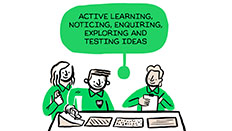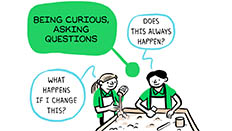Attitudes of Primary Teachers and Pupils
 Children and young people form their attitudes towards science in early primary school. These attitudes then have an impact on their attitudes to science in the later stages of their education and adult life (Royal Society 2010).
Children and young people form their attitudes towards science in early primary school. These attitudes then have an impact on their attitudes to science in the later stages of their education and adult life (Royal Society 2010).
... perhaps the chief reason for the importance of attitudes lies in their influence on choice about pursuing science and mathematics related studies.
In the context of science and mathematics they [attitudes] are made evident in the liking for, interest in and confidence in learning these subjects, though the attitudes that should be part of conducting science, eg open-mindedness, curiosity, persistence, are equally important.
Our research findings
 The PSQM is effectively developing science leaders in primary schools
The PSQM is effectively developing science leaders in primary schools- The teaching and learning of science is enhanced in the classroom of the science leader and across the school
- There is a positive impact on the attitudes of teachers and pupils evidenced in the liking for, interest in and confidence in teaching and learning science
- Further data gathering is needed to assess any subsequent impact of this change in attitude on the future engagement and attainment in science of these pupils
This research was carried out to evaluate the impact of RSC bursary-funded PSQM on primary science teaching (White, E., Dickerson, C., & Mackintosh, J. 2015. University of Hertfordshire). The research was funded by the Royal Society of Chemistry (RSC).